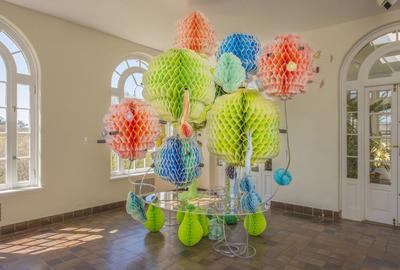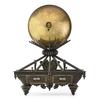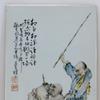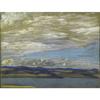EXCEPTIONAL CHINESE CERAMICS AND WORKS OF ART TO BE OFFERED AT CHRISTIE’S NEW YORK IN MARCH
- NEW YORK, New York
- /
- March 12, 2013
Christie’s sale of Fine Chinese Ceramics and Works of Art on 21-22 March will offer a broad range of artworks spanning from the Neolithic period to the early 20th century, Republic period. Rare and important works of art from private collections and museums will be available to collectors of all levels, including a finely cast bronze ritual wine vessel and cover, a rare yellow-ground blue and white vase, and a very rare imperial blue and white ring-shaped box and cover.
Highlighting the sale is an extraordinarily unusual yellow-ground blue and white vase, or hu, bearing a Qianlong seal mark in underglaze blue and of the period (1736-1795) (estimate: $300,000-500,000). The vase is incised with a flaming pearl on each side being contested by a full-faced, five-clawed dragon as a three-clawed dragon reaches for it from below amidst clouds and flames. Only one other Qianlong-marked vase of this rare combination of shape and decoration has been published to date and it is housed in the Ashmolean Museum in Oxford, England.
A rare finely cast bronze ritual wine vessel and cover, known as fangyi, will also be offered in the sale (estimate: $800,000-1,200,000). With its successful combination of elegant proportions, shape, and unified design, it is a classic example of the finely cast bronzes produced during the period from 13th-11th century BC when Yinxu, Anyang served as the capital of the Shang dynasty. Similar examples to the one being offered can be found in the Hakutsuru Art Museum in Kobe and in the Metropolitan Museum of Art in New York.
A very rare red-overlay white glass hu-form vase (estimate: $150,000-200,000) is richly carved in relief with decoration that relates to designs inlaid in precious metals on bronzes of the Warring States period and Han dynasty. This vase is particularly interesting because of the two glasswork techniques used in its production, which combined the extraordinary lapidary skills of the carver with the technical achievements forged in the Imperial Glassworks during the Qianlong period (1736-1795). Works similar in design and construction to this vase were greatly admired by the Qianlong Emperor, who was an avid collector and admirer of antiques and had a particular fascination with red-overlay glass works.
A very rare blue and white imperial ring-shaped box and cover from the late Ming dynasty (estimate: $500,000-700,000) is one of a small number of spectacular, large, ring-shaped boxes that were made at the Imperial kilns during the Jiajing reign (1552-1566). Due to the influx of imported cobalt at the time, many of the surviving examples are decorated with the same jewel-like blue as this box. This porcelain box was likely used for the safe-keeping of a variety of personal ornaments at the court of the Jiajing Emperor.




10270x400_c.jpg)


100x100_n.jpg)
100x100_c.jpg)












100x100_c.jpg)
